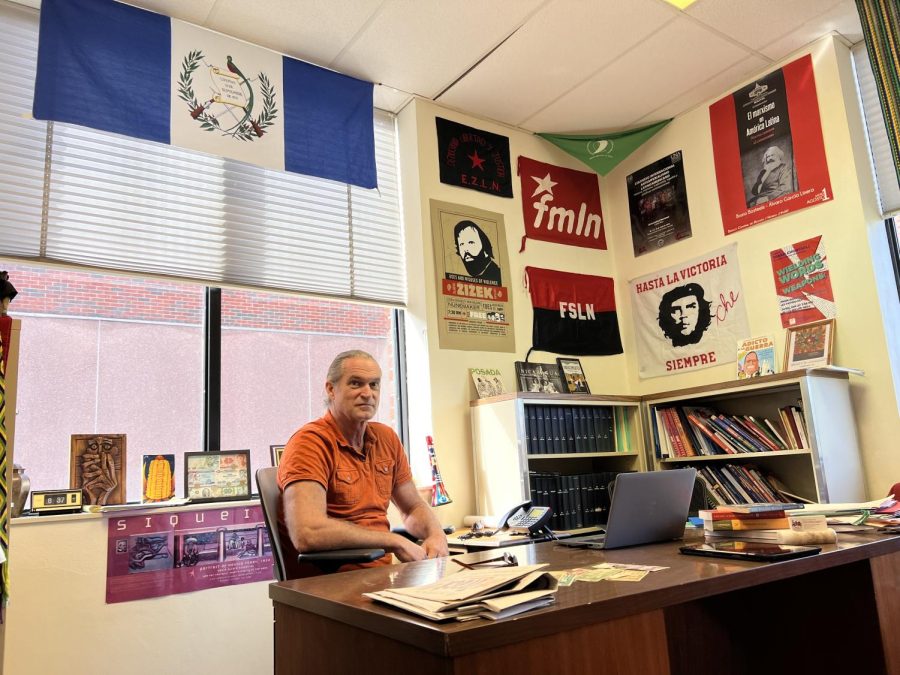FSLN flag displayed in professor’s office infuriates Nicaraguan students
Nathan Henne displays several Latin American flags behind his desk. One of these flags belongs to a regime which several Nicaraguan students view as repressive.
October 27, 2022
Late last month, graduate student Alejandra Arguello Fletes sent a letter to Loyola in response to a video post from the university’s official Instagram page on Friday Sept. 23. The post showed Nathan Henne, in his office with a flag that Nicaraguan students described as representing “trauma, disgust, and fear.”
The Instagram post was intended to celebrate Hispanic Heritage Month by exploring New Orleans’ Hispanic identity, and the marketing team asked a few faculty members from the Latin American Studies department to shoot a short video reflecting on the city’s Hispanic history, Henne said.
Despite the fact that it had nothing to do with the video, Henne said that the angle of the film revealed a flag with the letters FSLN on it over his head, as well as other historical resistances against U.S. imperialism and dictatorships.
The FSLN, or Frente Sandinista de Liberación Nacional, is a Nicaraguan political party run by the Nicaraguan president Daniel Ortega, and was established in the 1980s. Augusto César Sandino, who led the Nicaraguan resistance against U.S. occupation in the 1930s, inspired the party’s name.
“This wall in my office chronicles resistance over the last century in Central and Latin America,” Henne said.
Upon seeing the video, Fletes said she and other Nicaraguan students felt insulted that Henne had this flag up in his office. Fletes argued it was a symbol of the abuse Daniel Ortega is currently imposing on Nicaraguans as the country’s president. Henne defended the flag’s presence in his office, saying that to him, it represents Central American freedom.
Acknowledging the history
Henne, who was born and raised in Guatemala, said the FSLN led and won the Nicaraguan revolution against the Somoza government in 1979.
“I remember the day … when they won that revolution, and a lot of Latin America remembers and celebrates it,” Henne said.
Fletes said that the FSLN should not be used as a model for revolutionary history since Ortega has been in power since the November 2006 elections through use of fraudulent voting and other violations of constitutional rights and democracy.
“They manipulated the common desire to be a free country to abolish a dictatorship just to implement another,” Fletes said. “That’s why it cannot be an example.”
Furthermore, Fletes stated that the FSLN cannot serve as an example for the hemisphere because the same people who represented the FSLN political party in the 1980s are still present now. According to Fletes, the repression, corruption, and dictatorship did not begin “a few years ago,” but that Nicaraguans began to resist a few years ago.
A quick takedown
Fletes stated that many comments on the post from Loyola students expressed disappointment that Loyola would allow a faculty member to display this flag in their office despite the hardship that the people of Nicaragua are experiencing as a result of the FSLN.
“For me, Loyola is my safe place, and when I realized that there is a professor who has a flag that gives me nightmares, it was threatening,” Fletes said.
Loyola’s marketing department removed the video 54 minutes after it was posted, according to Fletes.
Fletes then composed a letter on behalf of Nicaraguan students at Loyola and sent it on Monday, Sept. 26 to the interim university president, the director of student affairs, the director of marketing, the director of ministry, and the vice president for equity and inclusion.
Henne said that Vice President of Marketing and Communications Rachel Hoormann let him know the video was being taken down.
Fletes said she hoped that the letter would encourage the university to become more aware and conscientious of the flag and its meaning.
“Maybe the FSLN tried to do something good in the 80s, but 40 years later we can see that the whole purpose of what they did was not with a good end,” Fletes said.
Henne said that he was unaware that Fletes sent the letter and that he learned about it from a fellow faculty member.
“To this day, nobody in the administration has told me about this letter,” Henne said.
A response deemed necessary
Henne claimed that after five days with no response from the university concerning the video’s takedown, he believed he was being ignored in order to let this issue quietly subside.
“After the post was taken down, I emailed marketing a couple of times saying ‘I’ve thought about this, and I don’t want to let it die,’ but they didn’t want any controversy,” Henne said.
Although Henne said he is very grateful and proud to be at Loyola where Jesuit tradition is so important, he said he believes that the way the university is going about this issue doesn’t align with what Loyola claims their ideals to be, which he said some of which are critical thinking and Jesuit tradition.
“We throw these things around, so we have to be willing to stand up when we see those things not being addressed,” Henne said. “We need to confront tension in a reasonable way and try to figure out what has happened in the past so we know what to do in the future.”
On Saturday, Oct. 1, Henne decided to send a letter in response to Fletes’ email to the university in hopes of facilitating healthy conversation and attempting to help students understand that he did not condone the FSLN’s recent violent acts.
“In the interest of the open dialogue that should be the foundation of what we do here at Loyola, I am writing this letter in order to defend my character and scholarship from the allegations and insinuations that I understand to be in this letter,” Henne wrote.
Henne’s letter detailed the roots of the FSLN and what they had done for Central America previous to the tragedies that Nicaraguans have endured in recent years. Henne said that he keeps the FSLN flag in his office because, prior to the recent troubles, the FSLN was a revolutionary political group that changed the trajectory of Central American government.
“It’s crucial. You can’t understand Central America without it,” Henne said. “I don’t support violent repression, and I don’t support the stuff Daniel Ortega has done, but I do very much support the the Sandinista and FSLN ideals leading up to the victory that toppled the brutal 40-year dictatorship of the Samozas – probably the most important event in my young life.”
Henne said that Ernesto Cardenal, a Nicaraguan Jesuit priest, liberation theologian and politician, explained his perspective best. He provided Cardenal’s following quote: “Ortega and the FSLN cannot continue to find legitimacy in the leftist movements that they have betrayed with their unscrupulous act. The heroes and martyrs of the Sandinista revolution do not deserve to have their memory stained by the genocidal acts of a dictator who betrayed them. The victims of Ortega and Murillo deserve justice.”
“I take this flag down, and we betray those martyrs,” Henne said.
An arguably nuanced conversation
Henne argued that society cannot address systemic injustices by remaining silent about them; rather, he argued that citizens of modern day society must continue to ask questions and examine history in an effort to avoid repeating the same mistakes.
Henne said he is teaching a class next semester on Central American revolutions of the 20th century through literature and film. One of those revolutions is the FSLN.
“I would welcome any and all dissenting voices to join that class to talk through some of these issues in a sustained dialogue that embraces the nuance of these situations in this messy thing we call history,” Henne said.
Fletes argued that as someone who has lived through the conflicts of FSLN, she believes that the conversation isn’t messy. She said that many Nicaraguan citizens who used to support the FSLN are now being imprisoned or killed after protesting against Ortega.
On Monday, Oct. 3, Fletes responded to Henne’s letter by thanking him for his perspective but stating that she could not agree with it because she had witnessed herself the injustices and human rights violations that Ortega had committed.
Both Henne and Fletes have stated that they do not intend to fight each other and are simply attempting to get their points across. Fletes explained, in her response letter, that she never wanted to silence Henne or request that his flag be removed but rather wanted to present her side of the story because her family has suffered through the FSLN’s oppressive and violent acts.
Loyola’s Associate Director of Public Affairs Patricia Murret said that the university has listened to and understands students’ concerns about the FSLN flag that was visible in Henne’s office.
“After meeting with students, the dean took steps to ensure that the professor who owns the flag understood their concerns and how that flag could be perceived,” Murret said. “Loyola takes its commitment to creating an environment that is conducive to learning while also balancing mutual respect and academic freedom among our campus community very seriously.”








Andrew Wolfe • Nov 1, 2022 at 2:08 pm
Henne’s decoration is an expression of academic freedom. I share Fletes’s assessment of Ortega and the Sandinistas, but in America we respond to opinions with debate and reasoning, not censorship. We shouldn’t respond to Ortega’s suppression of freedoms in Nicaragua with the suppression of free expression at Loyola.
That said, Loyola Marketing is responsible for presenting the University in an appealing and effective way. FSLN and Che Guevara will be neither, whether for prospective students or for donors.